Onshore vs Offshore Development: Difference and What to Consider
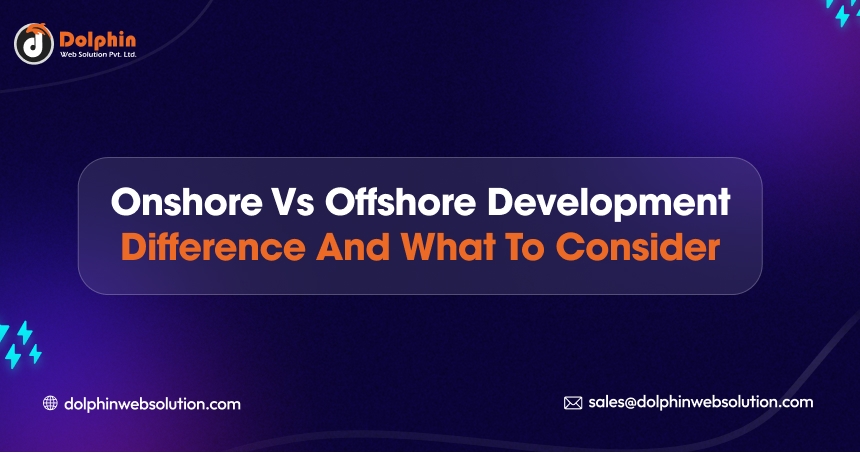
Table of Contents
- 1 Introduction
- 2 What Is Onshore Development?
- 3 Advantages Of Onshore Development
- 4 Disadvantages Of Onshore Development
- 5 What Is Offshore Development?
- 6 Advantages Of Offshore Development
- 7 Disadvantages Of Offshore Development
- 8 Key Aspects to Consider when Comparing Onshore vs Offshore Development
- 9 When To Choose Onshore?
- 10 When To Choose Offshore?
- 11 Conclusion
Summary :
This blog examines the contrasts between onshore and offshore software development, highlighting important distinctions and things to consider when deciding. It explores issues including quality control, communication difficulties, and cost-effectiveness, giving readers the knowledge they need to decide on their software development initiatives.
Introduction
Outsourcing bridges the web development gap, ensuring innovation and growth. Software outsourcing, projected at $430B in 2024 and $588B by 2027, is vital for staying competitive in the dynamic digital landscape. Bridging goals with technological realities are made possible by software outsourcing, but the decision between onshore and offshore firms is critical. Offshore refers to foreign services, frequently at a lesser cost, while onshore refers to services provided within the same nation.
Outsourcing is a dependable solution because tech skills shortages affect almost 1 in 5 firms. Offshore web development efficiently tackles this scarcity by leveraging worldwide talent pools and cost-effectiveness. Onshore development guarantees proximity and improved connectivity but may also cost more. The changing software development sector necessitates a balance between closeness, skill, and cost. Making appropriate selections for company objectives requires knowledge of the subtle differences between onshore and offshore development.
What Is Onshore Development?
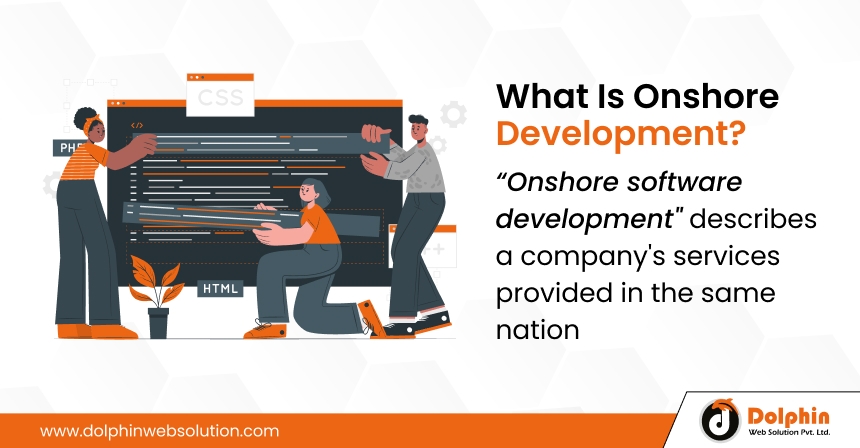
“Onshore software development” describes a company’s services provided in the same nation or companies as their main operation. For example, onshore software development is hiring someone for a project by a US-based firm that seeks assistance from US-based businesses.
Advantages Of Onshore Development
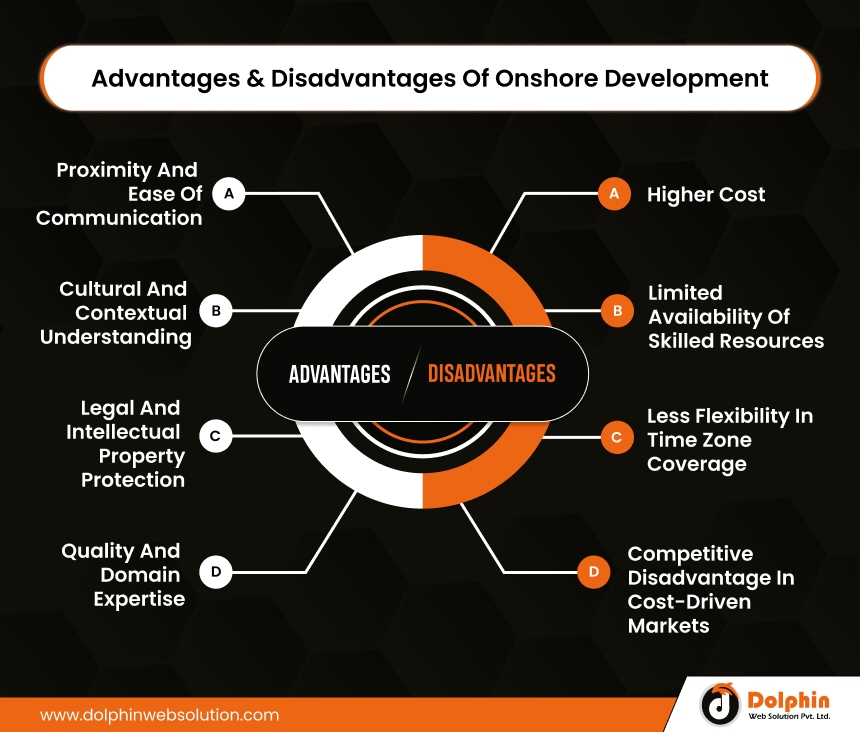
A. Proximity And Ease Of Communication
Communicating when you are in the same nation or area as your customer is simpler and more efficient. Similarities in language, culture, and time zones make it simpler to comprehend and meet the needs and expectations of the customer. In-person meetings and site visits are also more practical, encouraging teamwork and a more thorough project comprehension.
B. Cultural And Contextual Understanding
More legal protection and intellectual property rights are available with onshore development. Because the Web Development Team and the customer share the same legal framework, upholding intellectual property rights, enforcing contracts, and securing sensitive data is simpler. This might be especially crucial for initiatives that use private or proprietary data.
C. Legal And Intellectual Property Protection
Onshore development provides greater legal protection and intellectual property rights. The client and the Web Development Team operate under the same legal framework, making enforcing contracts, protecting sensitive information, and safeguarding intellectual property easier. This can be particularly important for projects involving proprietary or confidential data.
D. Quality And Domain Expertise
Onshore development teams frequently have unique industry knowledge and experience related to the client’s business or project needs. The job may be of a higher caliber because the team has a better grasp of the client’s business environment and can offer insightful advice.
Disadvantages Of Onshore Development
A. Higher Cost
Because corporations may have to pay extra to work with developers in their native nations, onshore development might be more expensive than offshore development. They have to pay more than they would elsewhere since they cannot compete on price tags due to the greater cost of living there. Adherence to local legislation is another important element, which raises costs and needs more time and resources.
B. Limited Availability Of Skilled Resources
The area might not have as many qualified resources, especially for specialized or niche technology. Longer recruiting periods and difficulty locating the appropriate personnel to fulfill project needs may arise. The lack of resources may lead to more competition and higher pay, raising project prices even further.
C. Less Flexibility In Time Zone Coverage
The working hours of the local team and the customer restrict onshore development. This could make providing 24-hour development coverage more challenging, especially for global initiatives or circumstances requiring quick decision-making. Coordination and cooperation may need more planning and be less flexible than when teams operate in different time zones.
D. Competitive Disadvantage In Cost-Driven Markets
When competing with less expensive options like offshore or near-shore models, onshore development may encounter difficulties in sectors where cost optimization is the main factor. While forgoing some advantages of onshore cooperation, clients looking for cost-effective solutions can favor offshore development.
Also Read:
How to Start a Jewelry Business OnlineWhat Is Offshore Development?

Working with a partner who produces software outside the nation is known as “offshore software development.” Thanks to technology advancements, developers now have much more freedom to get the best service possible within their budgets using this strategy.
You work with any software development business since you lack the knowledge to construct software independently. If your service is reasonably priced, you may focus on optimizing the essential functions. Tasks like ongoing maintenance and development won’t need hiring internal workers.
Advantages Of Offshore Development
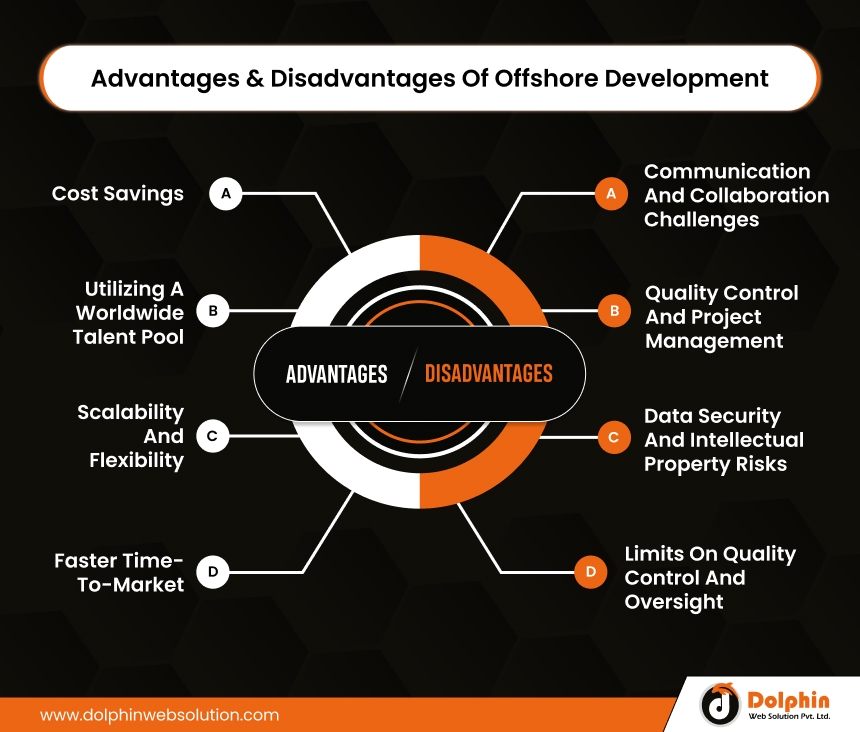
A. Cost Savings
The cost benefits of offshore software development are substantial. Organizations may frequently cut their development costs by taking advantage of reduced labor and operating costs in offshore locations. These cost savings are helpful when working on long-term projects or a tight budget.
B. Utilizing A Worldwide Talent Pool
When choosing offshore software development, as opposed to onshore outsourcing, we may employ personnel from all over the world. Naturally, searching overseas for the appropriate knowledge and experience broadens and deepens the talent pool that is accessible.
C. Scalability And Flexibility
Organizations may increase their development workforce more rapidly and effectively with offshore development. Finding resources to satisfy project objectives and deadlines is easier when a greater skill pool is available. Furthermore, offshore teams may frequently offer 24/7 development coverage, which shortens project schedules and facilitates quicker delivery.
D. Faster Time-To-Market
The capacity to collaborate across time zones can lead to quicker project completion timeframes. The offshore team can carry out development and project advancement when the onshore team is offline. Organizations may gain a competitive edge by bringing their goods or solutions to market faster thanks to this expedited development cycle.
Disadvantages Of Offshore Development
A. Communication And Collaboration Challenges
Communicating expectations in software development offshore can be challenging if English isn’t the first language. Even with CEO proficiency, subtleties may hinder effective communication.
B. Quality Control And Project Management
Some offshore companies may violate copyright and intellectual property regulations due to a lack of oversight, which might cause issues when they deliver the program. Additionally, they could select the least expensive software developers, which might lead to work of a worse caliber. Remote work poses supervision challenges: ensuring project standards and quality from a distance.
C. Data Security And Intellectual Property Risks
Offshore development entails exchanging confidential data and intellectual property with groups of people situated in several legal countries. Different laws, rules, and enforcement methods can complicate data security concerns and intellectual property protection. Organizations need to implement appropriate security measures, non-disclosure agreements, and legal protections to secure their assets.
D. Limits On Quality Control And Oversight
Maintaining project management effectiveness and quality requirements in offshore development might be more difficult. Remote work challenges: Ensuring project adherence, coding standards, and quality requires robust management and open communication for distant development teams.
Key Aspects to Consider when Comparing Onshore vs Offshore Development
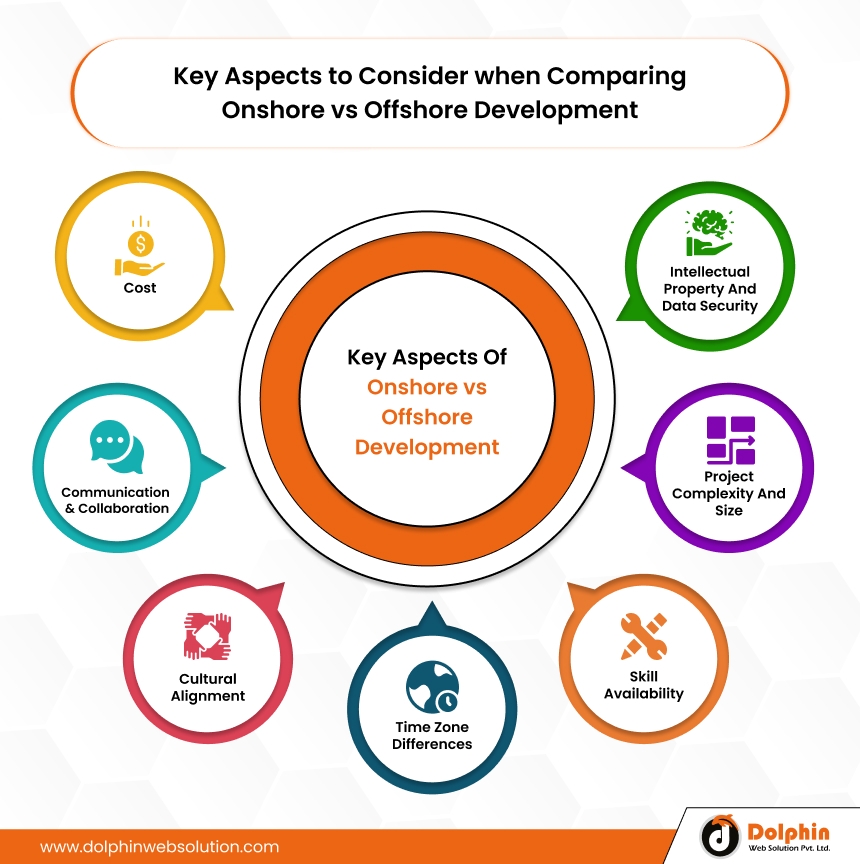
A. Cost
Budget-conscious projects may find offshore software development a more appealing alternative due to its potential for cost savings. Because labor costs vary by geography, offshore teams frequently have cheaper hourly rates. Hourly rates and the total project cost, which can be influenced by project scope, management, and possible communication issues, must be considered.
B. Communication And Collaboration
Proximity is one of the biggest benefits of onshore software development. Communication is smooth when your development team is located in the same area. Face-to-face meetings, real-time communication, and overlapping working hours may achieve a more seamless development process. Onshore development is frequently the best option for projects with changing needs or regular customer contacts.
C. Cultural Alignment
Understanding and cultural fit are essential for productive teamwork. Shared corporate processes, communication styles, and cultural norms are typically advantageous for onshore growth. To achieve successful cooperation, offshore development requires cross-cultural comprehension and adaptability. The cultural divide in offshore development may be closed by promoting cultural knowledge, encouraging candid communication, and laying clear rules.
D. Time Zone Differences
The time zone differences can be used to the advantage of offshore software development for continuous work cycles. Offshore teams can work on projects continuously, but onshore teams may have time zone constraints. Project completion may accelerate as a result. To prevent delays and misunderstandings, time zone variations must be appropriately managed.
E. Skill Availability
One crucial factor to take into account is the availability of trained resources. Access to a more specialized personnel pool with particular domain knowledge or experience may be possible through onshore development. Conversely, offshore development might offer a greater range of talents and knowledge since it can access a larger talent pool from other places. For a fair comparison, it is essential to evaluate the available resources and the unique skill needs of the project.
F. Project Complexity And Size
The appropriateness of each model depends partly on the project’s complexity and scale. Projects requiring domain-specific expertise, frequent client contacts, or real-time decision-making may be better suited for offshore development. Large-scale projects requiring scalability, cost efficiency, and 24-hour development coverage frequently favor offshore development.
G. Intellectual Property And Data Security
Legal and intellectual property (IP) issues are important when making decisions. A more open legal environment associated with onshore development can lower the likelihood of intellectual property conflicts. To protect your intellectual property, offshore development needs strong contracts and due diligence, which might result in higher legal expenses.
When To Choose Onshore?
Going offshore is a terrific option when you want high-quality bespoke development for your company. Onshore is the best option if you must interact with the core development team without experiencing any time zone or cultural issues. Onshore development may be the best choice when close cooperation, quality, and experience are crucial. Working with a local development team facilitates face-to-face contact, improved comprehension of business needs, and simpler communication, all contributing to a more seamless project execution. Furthermore, onshore teams frequently have a greater degree of knowledge and experience, which produces superior results. Even if onshore development might be more expensive, the advantages of increased cooperation and quality may exceed the costs.
When To Choose Offshore?
Offshore web development is The best option for affordable solutions without sacrificing quality. Due to its ability to support continuous development cycles, it is beneficial for projects with variable schedules. Selecting offshore teams can provide you access to a wide range of skilled individuals and specialized knowledge that isn’t often found locally. Owing to resource availability, offshore development is frequently advantageous for projects demanding scalability or quick deployment. However, when choosing offshore web development, great outcomes require efficient communication and project management.
Conclusion
Your company’s unique demands are the only thing that will affect your choice between onshore and offshore outsourcing services. For certain businesses, offshore is the greatest option, while onshore works better for others. The pros and drawbacks of any delivery model, together with the project’s budget, timeline, scope, and cost, should all be carefully taken into account since they will all greatly impact your choice.
With a “no surprises” flexible contract and a set monthly charge, you get the resources you require. Dolphin Web Solution can provide you with the finest aspects of both onshore and offshore software development strategies. Ultimately, the decision to offshore or onshore your IT consulting is very personalized and depends on your company’s objectives, goals, and financial constraints (for example, if you’re searching for average hourly pay). We would be happy to discuss your next project requirements and demonstrate the advantages of outsourcing for your company. For a free consultation, get in touch with us right now!


